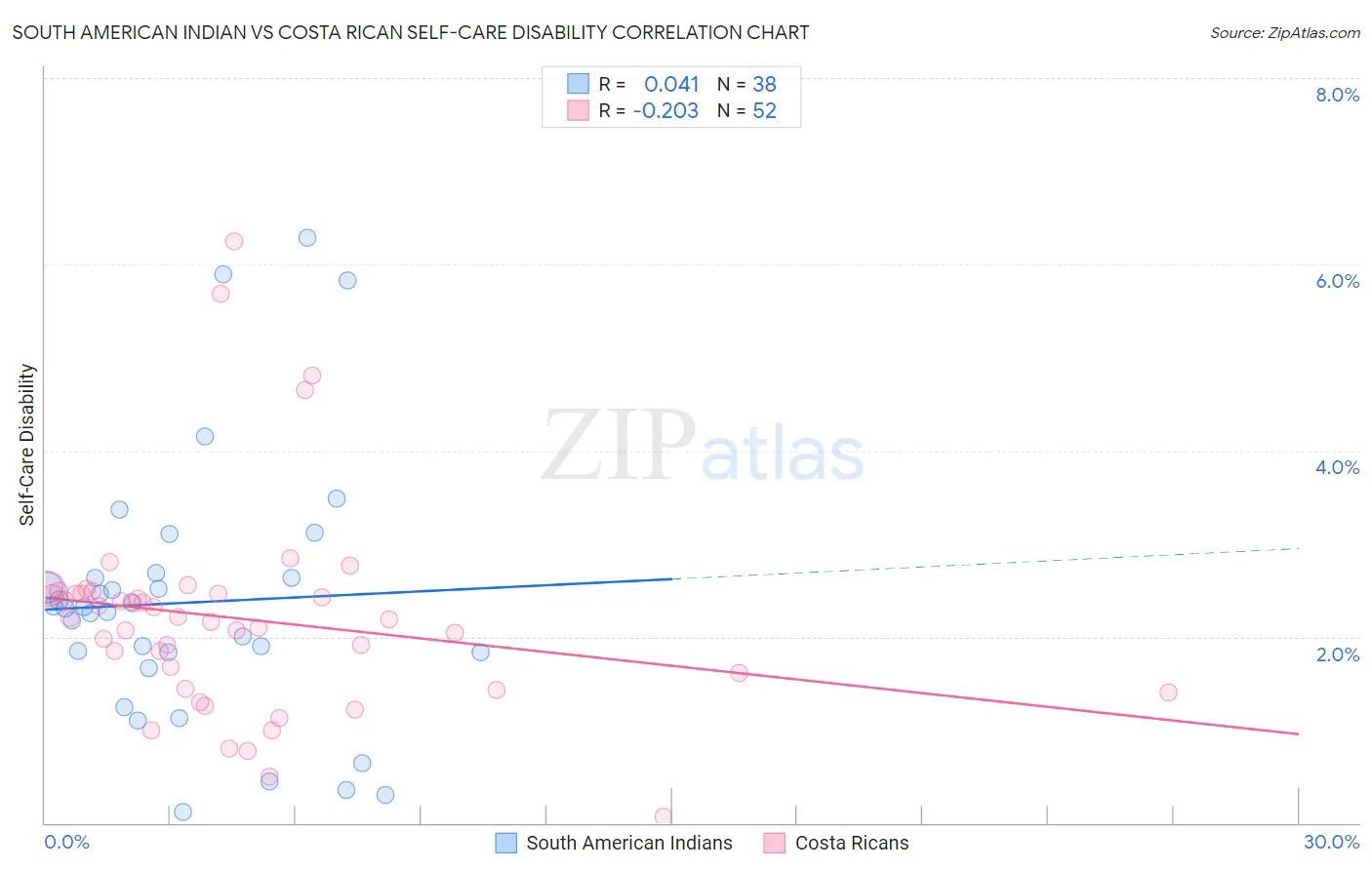South American Indian vs Costa Rican Self-Care Disability
COMPARE
South American Indian
Costa Rican
Self-Care Disability
Self-Care Disability Comparison
South American Indians
Costa Ricans
2.4%
SELF-CARE DISABILITY
87.2/ 100
METRIC RATING
136th/ 347
METRIC RANK
2.4%
SELF-CARE DISABILITY
80.8/ 100
METRIC RATING
144th/ 347
METRIC RANK
South American Indian vs Costa Rican Self-Care Disability Correlation Chart
The statistical analysis conducted on geographies consisting of 164,517,360 people shows no correlation between the proportion of South American Indians and percentage of population with self-care disability in the United States with a correlation coefficient (R) of 0.041 and weighted average of 2.4%. Similarly, the statistical analysis conducted on geographies consisting of 253,379,189 people shows a weak negative correlation between the proportion of Costa Ricans and percentage of population with self-care disability in the United States with a correlation coefficient (R) of -0.203 and weighted average of 2.4%, a difference of 0.59%.

Self-Care Disability Correlation Summary
| Measurement | South American Indian | Costa Rican |
| Minimum | 0.11% | 0.069% |
| Maximum | 6.3% | 6.2% |
| Range | 6.2% | 6.2% |
| Mean | 2.4% | 2.2% |
| Median | 2.3% | 2.2% |
| Interquartile 25% (IQ1) | 1.8% | 1.5% |
| Interquartile 75% (IQ3) | 2.6% | 2.5% |
| Interquartile Range (IQR) | 0.81% | 0.94% |
| Standard Deviation (Sample) | 1.4% | 1.1% |
| Standard Deviation (Population) | 1.4% | 1.1% |
Demographics Similar to South American Indians and Costa Ricans by Self-Care Disability
In terms of self-care disability, the demographic groups most similar to South American Indians are Austrian (2.4%, a difference of 0.020%), Laotian (2.4%, a difference of 0.070%), Immigrants from Croatia (2.4%, a difference of 0.070%), Sri Lankan (2.4%, a difference of 0.070%), and Russian (2.4%, a difference of 0.12%). Similarly, the demographic groups most similar to Costa Ricans are German (2.4%, a difference of 0.050%), Israeli (2.4%, a difference of 0.060%), Afghan (2.4%, a difference of 0.12%), Immigrants from Peru (2.4%, a difference of 0.20%), and Dutch (2.4%, a difference of 0.25%).
| Demographics | Rating | Rank | Self-Care Disability |
| Immigrants | Austria | 89.0 /100 | #130 | Excellent 2.4% |
| Poles | 88.9 /100 | #131 | Excellent 2.4% |
| Immigrants | South America | 88.8 /100 | #132 | Excellent 2.4% |
| Immigrants | Colombia | 88.5 /100 | #133 | Excellent 2.4% |
| Russians | 88.2 /100 | #134 | Excellent 2.4% |
| Laotians | 87.8 /100 | #135 | Excellent 2.4% |
| South American Indians | 87.2 /100 | #136 | Excellent 2.4% |
| Austrians | 87.0 /100 | #137 | Excellent 2.4% |
| Immigrants | Croatia | 86.6 /100 | #138 | Excellent 2.4% |
| Sri Lankans | 86.6 /100 | #139 | Excellent 2.4% |
| Immigrants | Uruguay | 85.4 /100 | #140 | Excellent 2.4% |
| Alaska Natives | 84.5 /100 | #141 | Excellent 2.4% |
| Immigrants | Peru | 83.2 /100 | #142 | Excellent 2.4% |
| Afghans | 82.3 /100 | #143 | Excellent 2.4% |
| Costa Ricans | 80.8 /100 | #144 | Excellent 2.4% |
| Germans | 80.1 /100 | #145 | Excellent 2.4% |
| Israelis | 80.0 /100 | #146 | Good 2.4% |
| Dutch | 77.5 /100 | #147 | Good 2.4% |
| Romanians | 75.8 /100 | #148 | Good 2.4% |
| Arabs | 75.7 /100 | #149 | Good 2.4% |
| Immigrants | Costa Rica | 75.1 /100 | #150 | Good 2.4% |